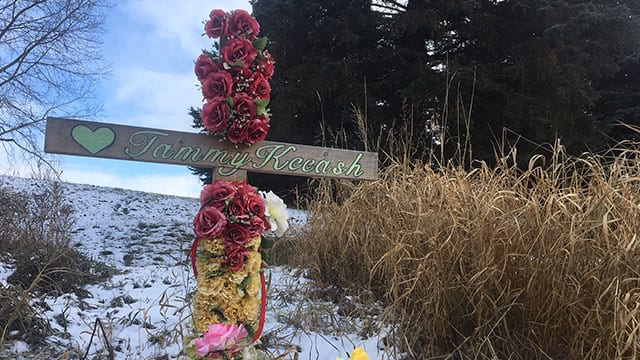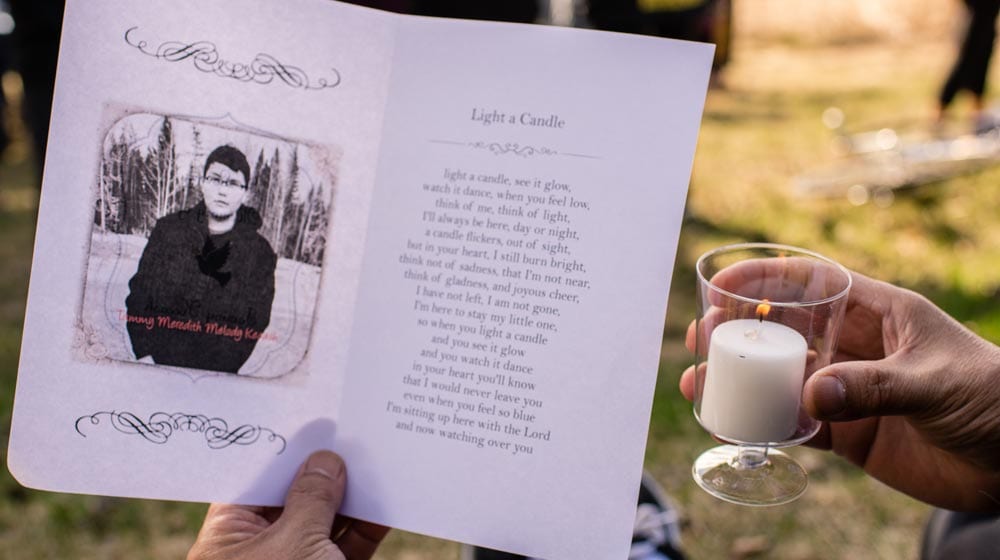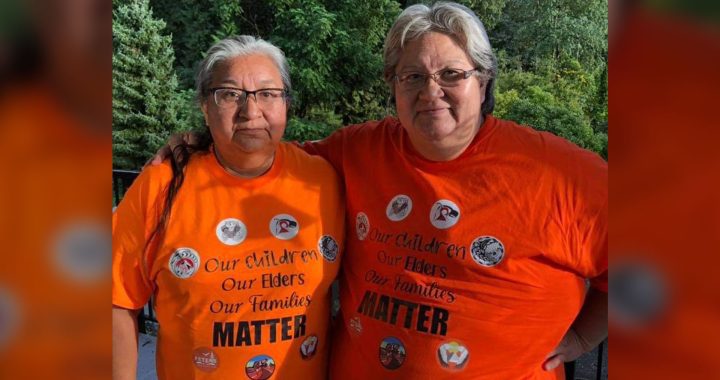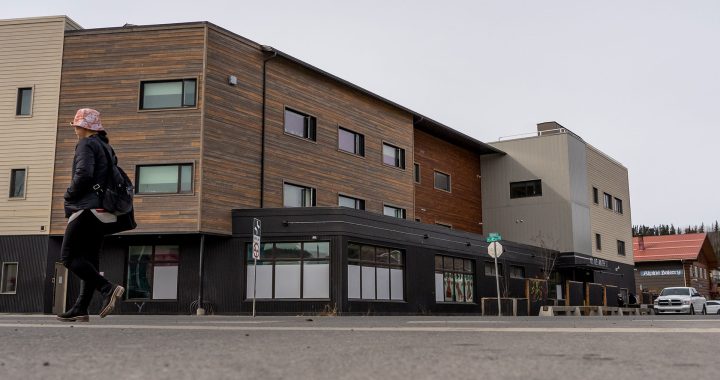
A cross still remains in last spot Tammy Keeash was seen alive.
A youth drinking to the point of hospitalization.
Staff ordering pizza at hospital and taking selfies.
Watching a child swallow a bottle of pills and doing nothing to stop it.
Kid goes missing for two days before anyone notices.
In just over a year police rack up 114 reports.
Those are a few of the examples verified in a new report into three former foster homes in Thunder Bay that the owner now admits it didn’t have the capacity to operate and certainly not to level it promised, which was to care for high-risk youth, several who were suicidal, including the late Tammy Keeash.
And that’s because Johnson Children’s Services (JCS), licensed to operate foster homes anywhere in the province, rushed into Thunder Bay beginning in March 2016 to meet the urgent demand for foster care space.
Johnson admits as much in the report released Tuesday by the office of the Ontario Child Advocate that closes for good May 1. Two other reports into similar child welfare homes were also released.
“In hindsight, JCS went through this process too quickly and without sufficient support from head office. Delivery of training, supervision, and coaching suffered as a result,” Johnson says in the report in response to its findings.
The company’s run in Thunder Bay barely lasted a year, only closing after the death of Keeash, a 17-year-old First Nations youth that drowned in a waterway May 2017.
Keeash was placed in one of the homes about two months before she died.
After her death the province stepped in and shut the homes down, but JSC continued to operate, briefly.
“It should be noted when the Ministry closed the JCS foster homes in Thunder Bay, the only immediate option for some of the former residents was placement in a motel, with 24hr one on one support. JCS staff was, for several weeks, contracted to supply that support, a clear indication that JCS continued to enjoy the trust of referring partners,” Johnson says, again in its response letter in the advocate’s report.
The report details several complaints about JSC that were investigated during its time in Thunder Bay.
Nation to Nation confirmed last November there were seven investigations that verified allegations ranging from lack of supervision to staff having poor training. Keeash was the eighth investigation based on court records. See that story by clicking here.

Irwin Elman, the former child advocate who was fired by the Doug Ford government, said someone like Keeash never stood a chance who was struggling in her last days.
“No, she did not,” Elman said.
There was another verified complaint among the investigations the advocate’s office picked up on.
“According to the children’s aid society notes, ‘[foster parent] reports to having no knowledge of how [foster child] travelled to Winnipeg,’” the report states.
The youth was gone for two days before anyone noticed.
But the advocate found more issues, including a 12-year-old taken to the emergency room by ambulance at 3:36 a.m. because she was drunk.
Another youth was in such a bad mental state she required two JSC staff with her at all times.
“When the doctor was subsequently interviewed by (advocate) Investigators, he explained that he was concerned about a youth who was ‘almost a daily visitor’ at the hospital, despite being supervised by 2 staff (also known as “2:1 staffing”) 24 hours per day. The doctor advised Investigators that he could not understand how repeated overdoses and other episodes of self-harm could occur if a young person was being supervised in a 2:1 manner, and that he had said this directly to JCS staff,” the report states.
The doctor was concerned about the staff and reported them to a children’s aid society.
The doctor had more to say in the advocate’s report.
“The doctor also provided examples of inappropriate conduct by JCS staff members at the hospital, including being asked to leave the hospital because they were sitting in security officer’s chairs, ordering pizza, and taking pictures of themselves in the emergency department,” the report states.
“The doctor then described what he felt to be the most serious incident: a young person was discharged from the hospital following a toxic Tylenol overdose and was immediately able to enter a drug store where she bought a bottle of Tylenol. She ‘drank’ it in front of the JCS staff members who ‘did nothing to stop her.’”
Staff told the doctor they didn’t think they were allowed to intervene.
“The doctor explained further, ‘I think on one of two occasions when she cut her wrists and when she overdosed, I spoke with the staff. So I was a little more aggressive – ‘Why are you just watching them instead of doing something?’” he explains.
“I think on the last occasion when she overdosed – I felt like the two workers, one of them seemed really upset about the whole incident – and voiced her frustration. I said, ‘Why don’t you do something – you’re employed to do this.’ [She said,] ‘We’re told we cannot do anything’ because of the concerns of the Constitution. So I thought, in a way, they seemed like they were misinformed about what they could and couldn’t do.”
Between May 2016 and April 2017, Thunder Bay police made a 114 calls to the homes. Most calls related to missing persons (27 reports), suicidal ideation/suicide attempts (19 reports) or a combination of these two issues the report states.
Despite pages of problems found in the homes, the advocate focused recommendations to the province and not JCS. It found lax regulations allowed JCS to set up in Thunder Bay without even informing the province.
The 10 recommendations vary from more oversight greater regulations. A complete list of the recommendations can be found on Page 62 of the report, including the province’s response, by clicking here.
Elman said he was disappointed with the province’s response to the report.
“The Ministry was/is so disappointing in its response to what they know,” he said. “Nothing has changed. The government still has not created standards of care for children in residential care.”
He said with the lack of any concrete action, cuts to the ministry and closing his office “seems like a recipe for disaster.”
Meanwhile, JCS doesn’t rule out returning to Thunder Bay.
“One day, JCS may again look to operate in the Thunder Bay area. Should that occur, the ‘start- up’ curve will be much longer and much less steep. All recruitment and training processes will occur prior to any offer of service delivery,” JCS states.
“A local fully qualified supervisor will be in office long before any service occurs. Senior management visits will be much more frequent. Referring agencies, the Ministry, and other stakeholders will be involved and informed every step of the way.”
The report never mentions Tammy Keeash by name.










Ah, my heart hurts today, reading this sad account, of the death of this young woman, Tammy Keeash. It’s painful.
As a victim of abuse at the hands of my mother, clinical services, and other sexual abuse at the hands of men who were supposed to be taking care of me, I too know the atrocities of life as a foster kid. I was lucky to have one set of parents, who, though not perfect, never abused me, and cared for me.
As a specialist caring for clients with issues like those faced by these kids in the JCS facilities, I know that these people are hired specifically to monitor at risk children, and these people are blatant racists. Was Tammy trans? Was she LGBTQ? Why was there such dis-regard for her, her life, her care? Perhaps it is simply because she was a First Nation child that was different from them?
I too, working in Boston, saw day care teachers abuse children. I reported that teacher but instead, I was black-listed from all those Boston Area Day Cares, simply because they did not want me reporting abuse.
I saw the abuse of a severely autistic kid in another home, and when I reported it, I was told, months later that the case had been dropped. When I asked why, I was told that “well, you are the one who made the complaint and they knew you were no longer in the country.”
The foster care system is out of touch with the needs of children, and the things that were allowed to happen to me as a foster kid are just disgusting, and have affected me my whole life.
Perhaps what needs to happen is that foster parents, and centers, obviously, need better screening, and in-depth criminal screening. These crimes do not happen just one time, and children, or in institutions, simply because abusers are repeat offenders, they are people suffering from varied maladies and they are perpetrators of these crimes, time and time again.
Tammy Keeash was, it appears, a beautiful young woman, who needed help, and these Thunder Bay systems failed her, and somebody should be held criminally responsible for that.